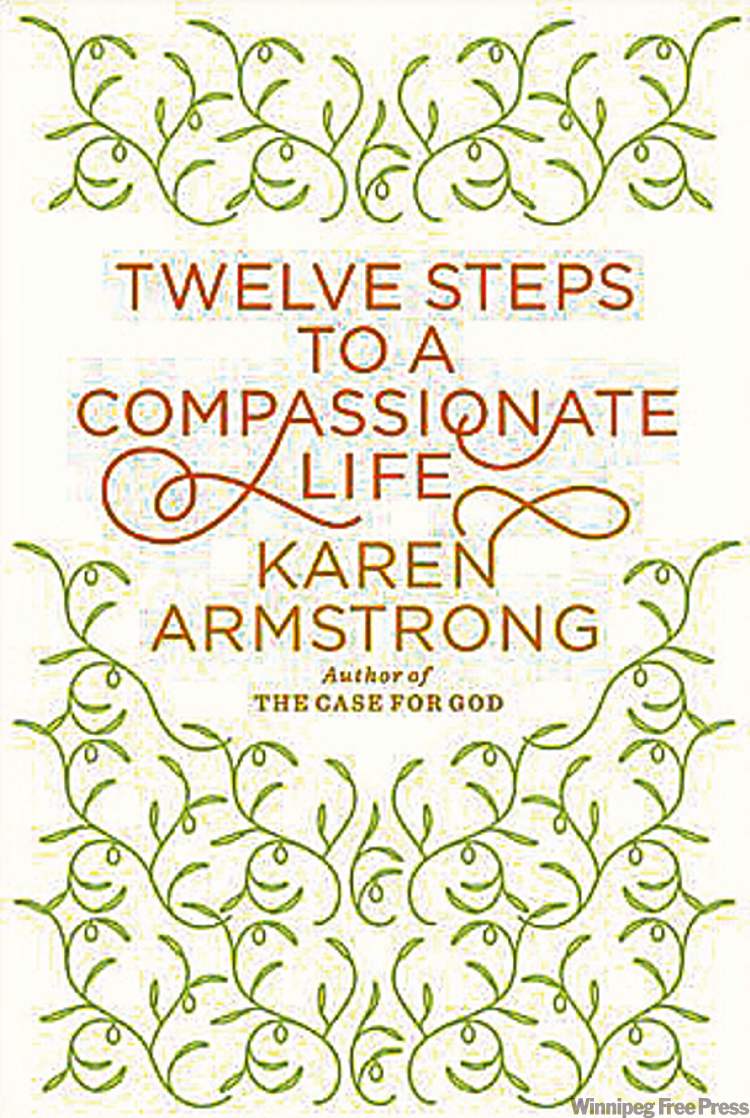12-step program directed at compassion
Prolific author on a non-denominational crusade
Advertisement
Read this article for free:
or
Already have an account? Log in here »
To continue reading, please subscribe:
Monthly Digital Subscription
$1 per week for 24 weeks*
- Enjoy unlimited reading on winnipegfreepress.com
- Read the E-Edition, our digital replica newspaper
- Access News Break, our award-winning app
- Play interactive puzzles
*Billed as $4.00 plus GST every four weeks. After 24 weeks, price increases to the regular rate of $19.00 plus GST every four weeks. Offer available to new and qualified returning subscribers only. Cancel any time.
Monthly Digital Subscription
$4.75/week*
- Enjoy unlimited reading on winnipegfreepress.com
- Read the E-Edition, our digital replica newspaper
- Access News Break, our award-winning app
- Play interactive puzzles
*Billed as $19 plus GST every four weeks. Cancel any time.
To continue reading, please subscribe:
Add Winnipeg Free Press access to your Brandon Sun subscription for only
$1 for the first 4 weeks*
*$1 will be added to your next bill. After your 4 weeks access is complete your rate will increase by $0.00 a X percent off the regular rate.
Read unlimited articles for free today:
or
Already have an account? Log in here »
Hey there, time traveller!
This article was published 08/01/2011 (5383 days ago), so information in it may no longer be current.
Twelve Steps to a Compassionate Life
By Karen Armstrong
Knopf Canada, 250 pages, $25

After a successful career documenting and explaining the great faith traditions of the world, English author Karen Armstrong has embarked on a religious crusade of her own: promoting compassion.
Not only does she believe in compassion, but as she suggests in the title of her latest book, Twelve Steps to a Compassionate Life, she is also zealous enough about her cause to outline how others can achieve it.
Yet to dismiss this small volume as a mere self-help manual is to trivialize the former Roman Catholic nun’s passion to create some understanding between faiths. It would also discount her previous work in such books as The Case for God, The Great Transformation and Muhammad: A Prophet for Our Time.
More history of religion than a 12-step program, more logical treatise than emotional appeal, this latest release from the prolific Armstrong grew out of a 2008 award from the non-profit organization TED (Technology, Entertainment, Design).
Along with being honoured as promoting an idea worth spreading, Armstrong was given $100,000, which she used to create, launch and promote the Charter for Compassion. She also enlisted the help of religious thinkers across the traditions to draft a charter, now online at www.charterforcompassion.org.
The basis for the charter is the underlying theme of the book: Compassion is at the core of all religious, ethical and spiritual traditions. Although the expression varies, Armstrong maintains that all religions promote some version of the Golden Rule: treat others as you wish to be treated.
The charter also calls for educating about other religious and cultural traditions, appreciating diversity and speaking against religious traditions that breed violence or hatred.
To achieve these lofty goals, Armstrong combines her ability to summarize complicated theological principles and religious histories with an accessible writing style to put forward a dozen ways to achieve compassion.

In addition to providing a brief overview of religious histories, Armstrong also gives provides a quick lesson in neuroscience, pointing out that humans are wired to be selfish and ultimately motivated by the four Fs: feeding, fighting, fleeing and reproducing (she avoids the popular vulgar word for the final F). She says humans have also evolved a new brain, the neocortex, the place where our reasoning and reflective powers reside, but the primordial passions of the four Fs still rule much of our lives.
Armstrong’s purpose in this small but substantial book is devoted to developing that human instinct to seek meaning in our lives, and she dedicates 12 short chapters outlining the road and activities toward compassion. In these 160 easy-to-read pages, she takes her readers from the first step of learning about compassion by being open to other traditions, customs, and ways of thinking, through to the final, and most difficult, step of loving their enemies.
Along the way, she packs in many millennia’s worth of religious thinking, history and examples in her discussion of the other steps, including empathy, action and speaking to each other.
In the end, Armstrong acknowledges that becoming compassionate doesn’t happen in 12 easy steps but takes the effort of a lifetime. Whether this project will change the world in the way Armstrong hopes is ultimately up to us.
Brenda Suderman writes about religion and faith for the Free Press and is studying interreligious dialogue as part of her course work toward a master’s degree in theology.

Brenda Suderman has been a columnist in the Saturday paper since 2000, first writing about family entertainment, and about faith and religion since 2006.
Our newsroom depends on a growing audience of readers to power our journalism. If you are not a paid reader, please consider becoming a subscriber.
Our newsroom depends on its audience of readers to power our journalism. Thank you for your support.

